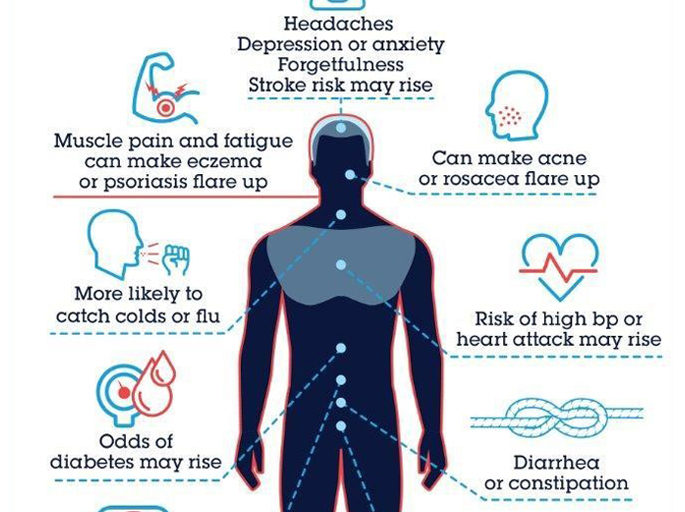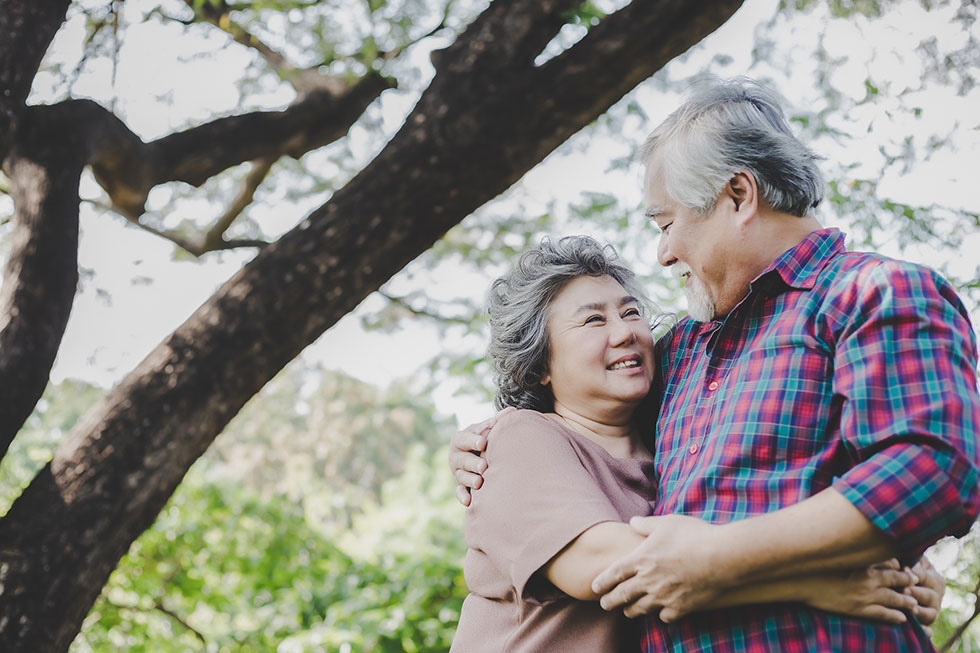For thousands of years, traditional healing systems such as those in Chinese medicine have embraced the role of the mind in the treatment and healing of diseases. Fast forward to the last century, we are now witnessing the same paradigm shift in western medicine along with a growing body of empirical science that is in support of this holistic approach towards healthcare.
The attention to the mind-body connection is especially relevant in the treatment of cancer because the disease creates intense physical, psychological, and emotional pressure for the patient and their loved ones. Although less often talked about, the psychological and emotional effects of cancer can oftentimes be as overwhelming and debilitating as its physical toll.
Emotional Effects of Cancer on Patients
Before, during and after treatment, cancer patients are likely to experience a wide range of emotions that are foreign to them; feelings such as being out of control, anger, denial, sadness, fear, guilt, and helplessness. While these feelings are all normal, they can be unpleasant to experience. They can also be intense, and emotions can change rapidly by the day, the hour, or even minute to minute, possibly causing the patient to feel overwhelmed.
Emotional Effects of Cancer on Families
Family and friends of cancer patients may also experience these intense and complex emotional effects of cancer, depending on the closeness of each relationship. Sudden changes in roles, responsibilities, physical and emotional needs, as well as future plans, can cause feelings of isolation, insecurity, sadness, frustration, anger, and even resentment.
For some families, facing the challenges of cancer together can strengthen their relationship. For others, the struggle to cope with the complicated emotions and lifestyle changes can lead them to experience intense and chronic psychological stress, which in turn, may create new problems and worsen existing ones.
How do Our Minds and Body React to Stress?
Psychological stress, or simply stress, is what we feel when we are under physical, mental, or emotional pressure. When we are under stress, our brain releases stress hormones such as adrenaline and cortisol in the body. These hormones help us get ready to respond to stress, whether it is to run, fight, or even freeze.
While small amounts of stress can be beneficial and healthy to us, excessive and long-term stress keeps the body trapped in a constant state of tension, also known as “fight or flight” mode. This often develops into physical and mental health problems.

Image 1. Physical effects of long-term stress include a weaker immune system, and a greater risk of heart attacks, diabetes, and mental health disorders like depressive or anxiety disorders.[1]
In cancer patients, long-term psychological stress may influence a cancerous tumour’s ability to grow and spread, and may even affect cancer outcomes [2][3] In contrast, cancer patients who are able to manage their stressors are less at risk of developing depressive disorders, neurotic and adjustment disorders, and substance use disorders, which in turn significantly reduces their risk of premature death. [4][5]
The same goes for families and caregivers of cancer patients. Partners of cancer patients, in particular, are expected to bear a large proportion of the stressors and burdens that follow in the course of cancer and are often at greater risk of these negative health outcomes. [6] Specifically, cancer caregiving has been related to increased blood pressure, dysregulation of the autonomic nervous system, hypothalamic-pituitary–axis dysregulation, immune changes, and poor health-related behaviours. Those who are able to use effective coping strategies to manage their stressors, such as relaxation and stress management techniques, are more likely to experience decreased caregiver burden, decreased depression, and better adjustment.
What You Can Do to Cope with Stress
To quote Nido Qubein, “Your present circumstances don’t determine where you can go; they merely determine where you start.”
If you identify as part of this vulnerable population, then it is important to note that self-care and adequate coping and emotion regulation skills are necessary for the preservation of your health and well-being. Moving forward, the following coping strategies may serve to provide some desired relief.
1) Training in relaxation techniques, and stress management
Cancer and its treatment put your body under constant stress and inflammation. Likewise, excessive stress from caregiving duties can result in compassion fatigue and poorer quality of living for caregivers and families of cancer patients.
In such instances, mind-body relaxation techniques such as the Emotional Freedom Technique (EFT; Image 2) and Tension Release Exercise (TRE; Image 3) can be beneficial in maintaining mental health. By releasing excess stress and tension through EFT and/or TRE you can help support your body’s proper physiological and psychological function.

Image 2. EFT relies on fingertip tapping to apply pressure on 9 meridian points to reduce the stress or negative emotion you feel from your stressor, ultimately restoring balance to your disrupted energy. [7]

Image 3. Tension and Trauma Release Exercise (TRE) is a somatic-based approach
comprised of a series of exercises that safely stimulates your psoas muscles – these muscles are where we often store physical, emotional, and psychological stress in our bodies over the course of our lives. The shaking, or neurogenic tremors, can result in a release of deep tension, stress, and trauma, which helps the body to return back to a state of balance. [8]
EFT and TRE interventions are especially good for when
-
- You are stressed and anxious
- You don’t feel like talking about your stress
- Have difficulty sleeping
- Would like a way to support mind-body-spirit wellness
2) Talk therapy
Negative thoughts and emotions can create stress in our lives by affecting the way we feel, and colouring our experiences so that many other things that we experience seem more overwhelming.
Talk therapy, such as Cognitive Behavioral Therapy and Acceptance and Commitment Therapy have been consistently found to be effective in the treatment of severe stress. [9][10]
However, you don’t need to be experiencing severe stress to benefit from this mode of treatment. Talk therapy can benefit anyone who is going through a difficult time or has emotional problems that they need help with. This is especially beneficial for people who struggle to confide in friends and relatives, for fear of judgement or backlash. Without your consent, professional mental health practitioners are to protect your privacy by keeping private information from third parties.
3) Social support in a group setting
In general, social support has been shown to be beneficial to the overall well-being of cancer patients and their caregivers. [11] Being able to talk about your concerns with others can be helpful in allowing you to vent and receive validation. Having someone there with a shoulder to cry on can be healing in times of stress or loneliness, and in other cases, people in your social network might provide support by taking care of immediate needs that must be addressed, such as bringing you a hot meal or giving you a ride when you need one.
Essentially, surround yourself with people who are caring and supportive, as this can help you to feel more capable of dealing with life’s stressors, and also help you to stay motivated when trying to achieve your goals.
Here are some cancer support groups that can help you through difficult times:
| General Cancer Support | National Cancer Centre Singapore | Tel: 65 6225 5655 Website: https://www.nccs.com.sg/patient-care/patient-support |
| Women Cancer Support Group | KK Women’s Cancer Support Group | Tel: 6394 2138/ 6394 2160 Website: https://www.kkh.com.sg/ |
| Bishana Ladies Support Group | Tel: 1800 727 3333 Website: https://www.singaporecancersociety.org.sg/get-help/cancer-survivor/join-a-support-group/reach-to-recovery-support-group.html |
|
| Breast Cancer Support Group | Reach to Recovery by Singapore Cancer Society | Tel: 6499 9132 Website: https://www.singaporecancersociety.org.sg/get-help/cancer-survivor/join-a-support-group/reach-to-recovery-support-group.html |
| Breast Cancer Foundation | Tel: 6352 6560 Website: https://www.bcf.org.sg/members-volunteers/join-membership/ |
|
| The Breast Cancer Support Group by Singapore General Hospital | Tel: 6321 4474 Website: https://www.sgh.com.sg/events/patient-care/breast-cancer-support-group |
|
| KK Hospital Alpine Blossoms Breast Cancer Support Group | Tel: 6394 5816 (Doris)/ 8121 7943 (Breast Care Nurse) Website: https://www.kkh.com.sg/ |
|
| Prostate Cancer | Walnut Warriors by Singapore Cancer Society | Tel: 6499 9132 Website: https://www.singaporecancersociety.org.sg/get-help/cancer-survivor/join-a-support-group/reach-to-recovery-support-group.html |
| Prostate Cancer Support Group (PCSG) by Tan Tock Seng Hospital (TTSH) | Tel: 63572494 / 63572491 Website: https://www.ttsh.com.sg/Patients-and-Visitors/Pages/Find-Conditions-and-Treatments-Details.aspx?condition=Prostate-Cancer-Support-Group |
|
| Colorectal Cancer | SemiColons Support Group by Singapore Cancer Society | Tel: 6499 9132 Website: https://www.singaporecancersociety.org.sg/get-help/cancer-survivor/join-a-support-group/reach-to-recovery-support-group.html |
| Colon Cancer Support Group by Tan Tock Seng Hospital | Tel: 6357 8366 | |
| Liver Cancer Support Group | Singapore Liver Cancer Support Group | Website: https://www.facebook.com/SingaporeLiverCancer/ |
| Children Cancer Support Group | Children’s Cancer Foundation Family Support Centre | Tel: 6394 8236 Website: https://www.ccf.org.sg/ |
| Caregiver Support Group | CanHOPE | Website: https://www.canhope.org/support-programmes |
| Caregiver Welfare Association | Tel: 64667957 Email: [email protected] Website: http://www.cwa.org.sg/ |
|
| Psychosocial support by Singapore Cancer Society | Tel: 1800-727-3333 Website: https://www.singaporecancersociety.org.sg/get-help/cancer-patient/cancer-and-me/counselling-services.html |
|
| Caregivers Connect | Website: https://www.facebook.com/thecaregiversconnect/ |
4) Medications for depression or anxiety
If you are struggling with depression and anxiety, medication may help to alleviate the symptoms so that you are able to make lifestyle changes.
If you have cancer, it is important to have a discussion with your health care provider about the potential side effects of the medication, as well as its potential for interaction with other current medications and treatment.
5) Exercise
Exercising during cancer treatment can help you feel better, and experience benefits such as reduced depression and anxiety, increased energy, and less pain.
If you have cancer, it is important to discuss an exercise program with your health care provider and be given the green light before you begin.
—–
This article is brought to you by Dr. Amanda Oh

Note: all words in Italics mentioned henceforth refer to the TCM organ system and not the anatomical organs/terms referenced in western medicine.
Disclaimer:
The content on this page is for information and educational purposes only. Such medical information may relate to disease, injury, drugs and other treatments, medical devices and/or health products. Medical information does not amount to advice, and if advice is needed an appropriate professional help should be sought. The disclaimer asserts that no warranties or representations are given in respect of the medical information, and that the website operator should not be held liable if a user suffers any injury or loss after relying upon the medical information.
References:
[1] https://www.webmd.com/
[2] Flores, I. E., Sierra-Fonseca, J. A., Davalos, O., Saenz, L. A., Castellanos, M. M., Zavala, J. K., & Gosselink, K. L. (2017). Stress alters the expression of cancer-related genes in the prostate. BMC cancer, 17(1), 621.
[3] Thaker, P. H., Han, L. Y., Kamat, A. A., Arevalo, J. M., Takahashi, R., Lu, C., … & Merritt, W. M. (2006). Chronic stress promotes tumor growth and angiogenesis in a mouse model of ovarian carcinoma. Nature medicine<span”>, 12(8), 939-944.
[4] Batty, G. D., Whitley, E., Gale, C. R., Osborn, D., Tynelius, P., & Rasmussen, F. (2012). Impact of mental health problems on case fatality in male cancer patients. British journal of cancer, 106(11), 1842-1845.
[5] Chang, C. K., Hayes, R. D., Broadbent, M. T., Hotopf, M., Davies, E., Møller, H., & Stewart, R. (2014). A cohort study on mental disorders, stage of cancer at diagnosis and subsequent survival. BMJ open, 4(1).
[6] Northouse, L. L., & Swain, M. A. (1987). Adjustment of patients and husbands to the initial impact of breast cancer. Nursing Research.
[7] https://wellinsiders.com/5-steps-to-reduce-your-stress-and-anxiety-with-eft-tapping/
[8] https://traumaprevention.com/what-is-tre/
[9] Groarke, A., Curtis, R., & Kerin, M. (2013). Cognitive‐behavioural stress management enhances adjustment in women with breast cancer. British journal of health psychology, 18(3), 623-641
[10] Mohabbat-Bahar, S., Maleki-Rizi, F., Akbari, M. E., & Moradi-Joo, M. (2015). Effectiveness of group training based on acceptance and commitment therapy on anxiety and depression of women with breast cancer. Iranian journal of cancer prevention, 8(2), 71.
[11] Dukes Holland, K., & Holahan, C. K. (2003). The relation of social support and coping to positive adaptation to breast cancer. Psychology and health, 18(1), 15-29.

